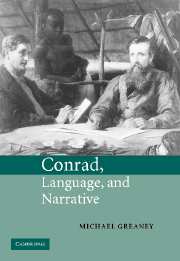Book contents
- Frontmatter
- Contents
- Acknowledgements
- Introduction
- PART I SPEECH COMMUNITIES
- PART II MARLOW
- PART III POLITICAL COMMUNITIES
- 7 Nostromo and anecdotal history
- 8 Linguistic dystopia: The Secret Agent
- 9 ‘Gossip, tales, suspicions’: language and paranoia in Under Western Eyes
- Conclusion
- Notes
- Bibliography
- Index
9 - ‘Gossip, tales, suspicions’: language and paranoia in Under Western Eyes
Published online by Cambridge University Press: 22 September 2009
- Frontmatter
- Contents
- Acknowledgements
- Introduction
- PART I SPEECH COMMUNITIES
- PART II MARLOW
- PART III POLITICAL COMMUNITIES
- 7 Nostromo and anecdotal history
- 8 Linguistic dystopia: The Secret Agent
- 9 ‘Gossip, tales, suspicions’: language and paranoia in Under Western Eyes
- Conclusion
- Notes
- Bibliography
- Index
Summary
If the reports of recent critics are anything to go by, Under Western Eyes should carry a health warning: a novel about the duplicity of language, it is itself adroitly duplicitous; an ‘aggressive text’, it ‘hates its readers’ and ‘routs the liberal subject’. This is evidently not a novel for the faint-hearted, yet rumours of its aggressive designs on the unsuspecting reader have, if anything, served only to enhance its reputation. In the wake of a series of scholarly reassessments, many of which lay powerful emphasis of the linguistic self-consciousness of the novel, the critical standing of Under Western Eyes has never been higher.
Espionage and political violence are as central to Under Western Eyes as they were to The Secret Agent; the novels also share a decidedly edgy relationship with the ‘general reader’. But in terms of its representation of language and human subjectivity, Under Western Eyes might be read as a brutally unsentimental rewriting of Lord Jim. Kirylo Sidorovitch Razumov, the novel's studiously innocuous hero, commits a grievous betrayal of trust and is pursued from St Petersburg to Geneva by compromising rumours and echoes of his guilt. The St Petersburg/Geneva dichotomy superficially resembles the Patna/Patusan split in Lord Jim; but for Razumov there is no Patusan, no compensatory linguistic utopia, no Jim-like martyrdom – only a final deafness that functions both as a sadistic ‘remedy’ for his fear of words and as a violent caricature of the general reader's own ‘deafness’ to the finer nuances of Conrad's prose.
- Type
- Chapter
- Information
- Conrad, Language, and Narrative , pp. 152 - 166Publisher: Cambridge University PressPrint publication year: 2001



